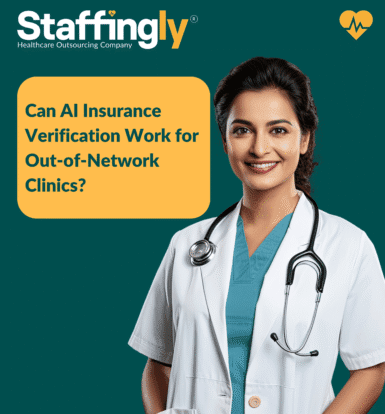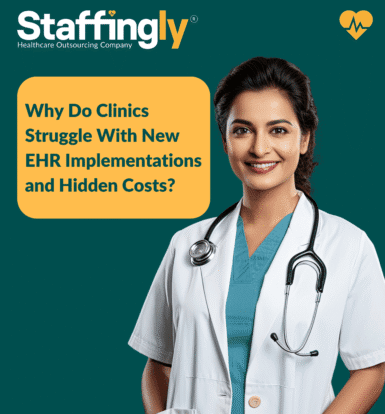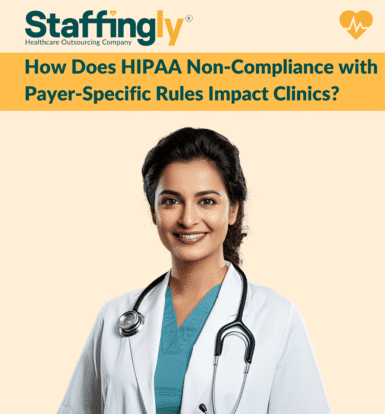On-Demand Outsourcing BPO Services for Healthcare Providers With 24/7 Coverage!
Save up to 70% on staffing costs!
Browse Specialty Staffing Services
How to Reduce Insurance Denials With Verification?
Healthcare professionals continue to share frustration about insurance verification gaps. One provider described: “We are having issues with getting insurance verification benefits resulting in denials and loss of revenue. Front desk staff is not doing their job properly causing headaches with billing.” This single comment reflects a wider issue across hospitals and clinics. Missed or incomplete insurance verification leads to denials, delayed payments, and dissatisfied patients. The challenge has sparked conversations about whether software can solve the problem, which EMRs

Will AI Really Replace Medical Billing and Coding in Healthcare?
A healthcare billing specialist recently posted: “Do you guys see medical billing and coding being replaced by AI, or is it unlikely? Have you used AI at your work yet?” That single question sparked a heated debate among coders, RCM experts, and healthcare administrators. Some said their hospitals already use AI for claim scrubbing and coding. Others shared horror stories of “hundreds of denials” from basic errors. One coder summed up the sentiment: “AI saves time, but we spend twice

Can AI Insurance Verification Work for Out-of-Network Clinics?
Insurance verification remains one of the most time-consuming and frustrating tasks for clinics and hospitals. A medical assistant recently shared: “Has anyone had success using an AI bot for insurance verification? I work for a concierge practice that does a lot of CTA and labs. We’re out-of-network with all plans, but I’d like to see if diagnostics could at least count toward patient deductibles.” This experience opened a wider conversation among healthcare professionals about how AI is being used for

Why Do Clinics Struggle With New EHR Implementations and Hidden Costs?
Healthcare professionals often expect new EHR systems to simplify workflows, but many describe the opposite experience. One mid-level manager from a community mental health clinic recently shared: “We switched from Credible to MyEvolve two months ago, and it has been a disaster. It’s pure chaos; we are implementing it ourselves, and things are not working.” The clinic reported broken portals, unexpected costs, poor reporting, and staff frustration. Training was limited and support expired quickly unless the clinic paid extra. The

Can Multi Agent AI Solve Workflow Challenges in Healthcare Clinics?
Healthcare professionals continue to share frustrations with single-purpose AI tools that fail to connect into real clinic workflows. One user explained the reality: “The multi-agent approach addresses a real problem, most healthcare AI tools solve individual pain points but don’t connect into seamless workflows, leaving clinics with fragmented solutions.” Although surveys show excitement for AI, only 17 percent of long-term-care leaders report that current tools are useful. The gap between expectations and actual results is wide. Many professionals say integration

What Matters First: HIPAA Compliance in Healthcare Outsourcing Success?
A small healthcare outsourcing founder recently shared: “We’re trying to get our first client, but everyone keeps asking for HIPAA compliance. We haven’t even touched PHI yet — how do we start?” That question echoes across every healthcare outsourcing forum. On one hand, HIPAA compliance is non-negotiable — the law is absolute once Protected Health Information (PHI) is involved. On the other, smaller firms feel the pressure to invest in compliance long before revenue begins. As one compliance officer joked

How Efficient Revenue Cycle Management Benefits Healthcare Providers and Patients?
Healthcare professionals are increasingly seeking ways to improve their understanding of the revenue cycle and healthcare finance to support their practices and patient care. A recent post on professional healthcare forums highlighted a course focused on healthcare finance and revenue cycle management, designed to help clinicians and administrators work more effectively with billing and reimbursement processes. explains the practical value of revenue cycle knowledge, the critical components healthcare providers should understand, and how specialized operational support can help optimize revenue

How Does HIPAA Non-Compliance with Payer-Specific Rules Impact Clinics?
For most clinics, HIPAA compliance is treated as a given locked filing cabinets, secure EMRs, encrypted calls. But what about compliance with payer-specific rules? Every insurer has its own requirements for claims, documentation, and coding. Missing those details doesn’t just slow reimbursements it can trigger HIPAA violations, denied claims, and lost revenue. 💬 “We followed HIPAA, but one missed payer rule led to a denied claim and a patient complaint.” The truth? Compliance is not one-size-fits-all. To stay safe and
 Book a Demo to Build Your Team Today!
Book a Demo to Build Your Team Today!


 Read Case Studies
Read Case Studies 



 Virtual Medical Assistants
Virtual Medical Assistants



